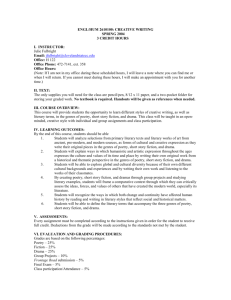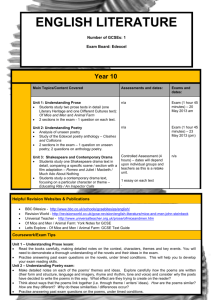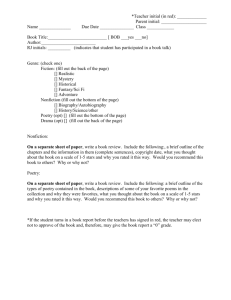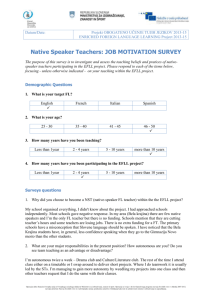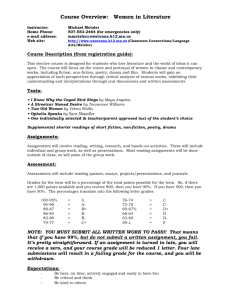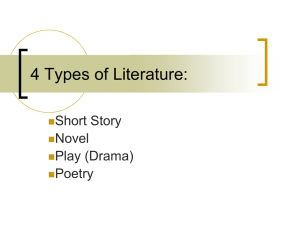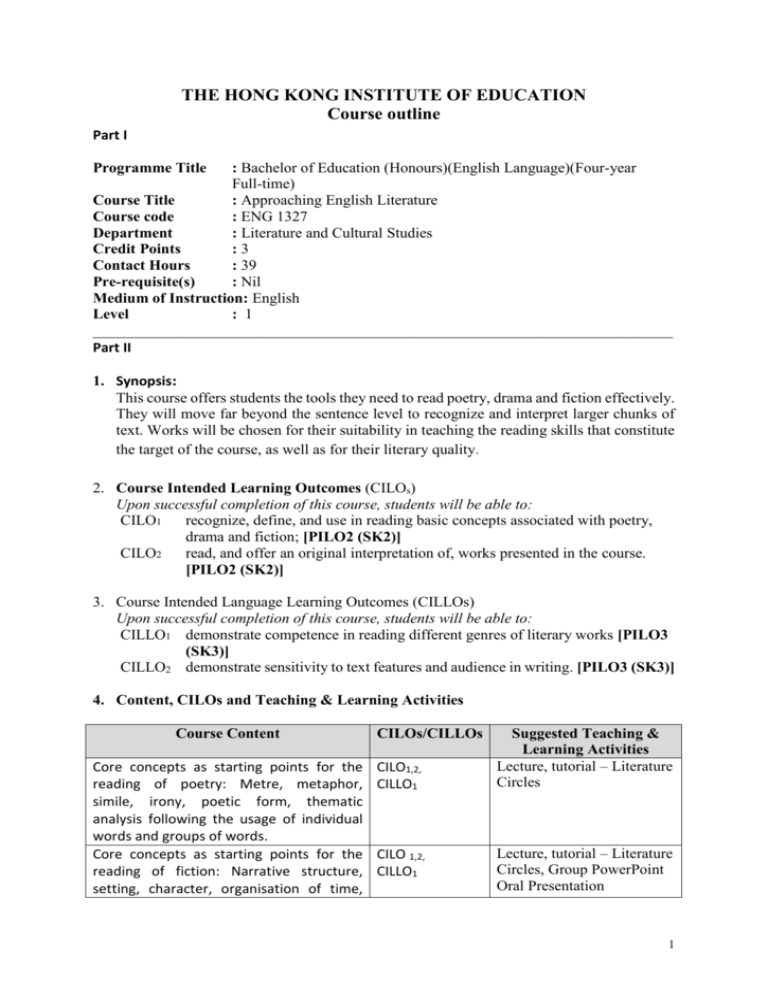
THE HONG KONG INSTITUTE OF EDUCATION
Course outline
Part I
Programme Title
: Bachelor of Education (Honours)(English Language)(Four-year
Full-time)
Course Title
: Approaching English Literature
Course code
: ENG 1327
Department
: Literature and Cultural Studies
Credit Points
:3
Contact Hours
: 39
Pre-requisite(s)
: Nil
Medium of Instruction: English
Level
: 1
___________________________________________________________________________
Part II
1. Synopsis:
This course offers students the tools they need to read poetry, drama and fiction effectively.
They will move far beyond the sentence level to recognize and interpret larger chunks of
text. Works will be chosen for their suitability in teaching the reading skills that constitute
the target of the course, as well as for their literary quality.
2. Course Intended Learning Outcomes (CILOs)
Upon successful completion of this course, students will be able to:
CILO1
recognize, define, and use in reading basic concepts associated with poetry,
drama and fiction; [PILO2 (SK2)]
CILO2
read, and offer an original interpretation of, works presented in the course.
[PILO2 (SK2)]
3. Course Intended Language Learning Outcomes (CILLOs)
Upon successful completion of this course, students will be able to:
CILLO1 demonstrate competence in reading different genres of literary works [PILO3
(SK3)]
CILLO2 demonstrate sensitivity to text features and audience in writing. [PILO3 (SK3)]
4. Content, CILOs and Teaching & Learning Activities
Course Content
Core concepts as starting points for the
reading of poetry: Metre, metaphor,
simile, irony, poetic form, thematic
analysis following the usage of individual
words and groups of words.
Core concepts as starting points for the
reading of fiction: Narrative structure,
setting, character, organisation of time,
CILOs/CILLOs
CILO1,2,
CILLO1
CILO 1,2,
CILLO1
Suggested Teaching &
Learning Activities
Lecture, tutorial – Literature
Circles
Lecture, tutorial – Literature
Circles, Group PowerPoint
Oral Presentation
1
organisation of space, narrative point of
view.
Core concepts as starting points for the
reading of drama: Conventions of dramatic
writing, stage terminology, visualising a
play based on a written text, tableau,
interaction of character, the nature of the
dramatic moment.
Core concepts in performance skills:
expression,
emphasis,
intonation,
character.
Philosophical considerations: how the
marks on the page produce meaning, and
how personal interpretation is and is not
limited by the text.
Building competence in reading literary
works: Structures of different genres in
literature.
CILO 1,2,
CILLO1
Lecture, tutorial – Role play
CILLO1
Lecture, tutorial – Role play
CILLO1
Lecture, tutorial – Literature
Circles
CILO1,2,
CILLO1
CILLO2
Literature Circles
5. Assessment Task
Assessment Tasks
Weighting (%)
CILOs/CILLOs
a. Poetry Analysis
40
CILO2,
CILLO1
CILLO2
b. Examination
60
CILO1,2,
CILLO1
6. Required Texts
Gordimer, N., Achebe, C. et al.. (1998). Four Continents. Genoa, Cideb Editrice.
Phillips. J. (Ed.)(1995). Poems Deep & Dangerous. Cambridge, Cambridge University Press.
Golding, W. (1973). Lord of the Flies. Faber and Faber.
2
(These texts are essential and will be available for purchase from the Campus Bookshop.)
7. Recommended Reading
Textbooks: (by the order of relevance)
Brown, James S. (2005). A Practical Introduction to Literary Study. Upper Saddle River, N.J. :
Pearson Prentice Hall, (PR21 .B76 2005)
Stanford, Judith A. (2006). Responding to Literature: Stories, Poems, Plays and Essays.
Boston, Mass.: McGraw-Hill. (PE1417. R4745.2006)
Guth, H. P. (2003). Discovering Literature: Stories, Poems, Plays. Prentice Hall.
(PE1417.G866).
Anthologies: (by the order of relevance)
Jacobs, Richard (2001). A Beginner’s Guide to Critical Reading: An Anthology of Literary
Texts. London: Routledge. (PR83.J34.2001)
Barrie Wade (1988). Into the Wind Contemporary Stories in English. London: E J Arnold.
(PR1309.S5 I67 1988)
Shackleton, Mark (1985). Double Act: Ten One-Act Plays on Five Themes. London: E.
Arnold.(PR1272.D68)
DiYanni, Robert (1989). Reading Poetry: An Anthology of Poems. NY:
McGraw-Hill.(PE1127.P57R44)
DiYanni, Robert (1990). Reading Drama” An Anthology of Plays. NY:
McGraw-Hill.(PN6112.R43)
DiYanni, Robert (1988), Reading Fiction: An Anthology of Short Stories. NY: McGraw-Hill
(PE1127.S45D59)
Useful References on Poetry:
Eagleton, T. (2007). How to read a Poem. Malden, MA: Blackwell (PR502.E3).
Kennedy, X. J. & Gioia, Dana. (2005). An Introduction to Poetry. New York: Longman,
Pearson. (PN1042.K39).
Polonsky, Marc. (1998). The Poetry Reader’s Toolkit: A Guide to reading and understanding
Poetry. Lincolnwood, ILL: NTC Pub Group. (PN1042.P58).
Miller, Lindy. (2002) Mastering Practical Criticism. New York: Palgrave. (PN81.M55)
Peck, John & Coyle, Martin. (1995). Practical Criticism. Basingstoke, Hampshire:
Macmillan.(PN1031.P43).
Useful References on Drama:
Sanger, Keith. (2001). The Language of Drama. London: Routledge (PN1631.S26).
Rush, David. (2005). A Student Guide to Play Analysis. Carbondale, Southern Illinois
University Press (PN1707.R77).
Lennard, John & Luckhurst, Mary. (2002). The Drama Handbook: A Guide to Reading Plays.
Oxford: Oxford University Press. (PN1655.L46).
Pickering, Kenneth. (2003). Studying Modern Drama. New York: Palgrave. (PN1701.P53).
Burton, Bruce. (2004). Creating Drama. Melbourne: Pearson. (PN1655.B87).
3
Useful References on Short Story/Novel:
Chatman, Seymour. (1978). Story and Discourse. Ithaca: Cornell UP (NX650.N37C45)
Genette, Gerard. (1980). Narrative Discourse. Trans. by Jane E. Lewin. Ithaca: Cornell UP.
(PQ2631.R63A791713)
Rimmon-Kenan, Shlomith. (1983). Narrative Fiction. London: Routledge. (PN212.R55)
Toolan, Michael. (2001). Narrative: A Critical Linguistic Introduction. 2nd Edition. London:
Routledge.(P302.7T66)
March-Russell, Paul. (2009). The Short Story: An Introduction. Edinburgh: Edinburgh
University Press. (PN3373.M37)
Mullan, John. (2006). How Novels Work. New York: Oxford University Press. (PR826.M86).
8. Related Web Resources
http://vos.ucsb.edu/index-netscape.asp
http://poetry.about.com
9. Related Journal
ariel
4

